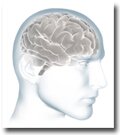A Loss of Plasticity of the Brain?
 Why is it that only some drug users become addicts? This is the question that has been addressed by the teams of Pier Vincenzo Piazza and Olivier Manzoni, at the Neurocentre Magendie in Bordeaux (Inserm unit 862). Why is it that only some drug users become addicts? This is the question that has been addressed by the teams of Pier Vincenzo Piazza and Olivier Manzoni, at the Neurocentre Magendie in Bordeaux (Inserm unit 862).
These researchers have just discovered that the transition to addiction could result from a persistent impairment of synaptic plasticity in a key structure of the brain.
This is the first demonstration that a correlation exists between synaptic plasticity and the transition to addiction.
The results from the teams at Neurocentre Magendie call into question the hitherto held idea that addiction results from pathological cerebral modifications which develop gradually with drug usage. Their results show that addiction may, instead, come from a form of anaplasticity, i.e. from incapacity of addicted individuals to counteract the pathological modifications caused by the drug to all users.
The voluntary consumption of drugs is a behaviour found in many species of animal. However, it had long been considered that addiction, defined as compulsive and pathological drug consumption, is a behaviour specific to the human species and its social structure.
In 2004, the team of Pier Vincenzo Piazza showed that the behaviours which define addiction in humans, also appear in some rats which will self administer cocaine. Addiction exhibits astonishing similarities in men and rodents, in particular the fact that only a small number of consumers (humans or rodents) develop a drug addiction. The study of drug dependent behaviour in this mammal model thus opened the way to the study of the biology of addiction.
Now, the teams of Pier Vincenzo Piazza and Olivier Manzoni are reporting discovery of the first known biological mechanisms for the transition from regular but controlled drug taking to a genuine addiction to cocaine, characterised by a loss of control over drug consumption.
Chronic exposure to drugs causes many modifications to the physiology of the brain. Which of these modifications is responsible for the development of an addiction? This is the question the researchers wanted to answer in order to target possible therapeutic approaches to a disorder for which treatments are cruelly lacking.
Source: INSERM
|